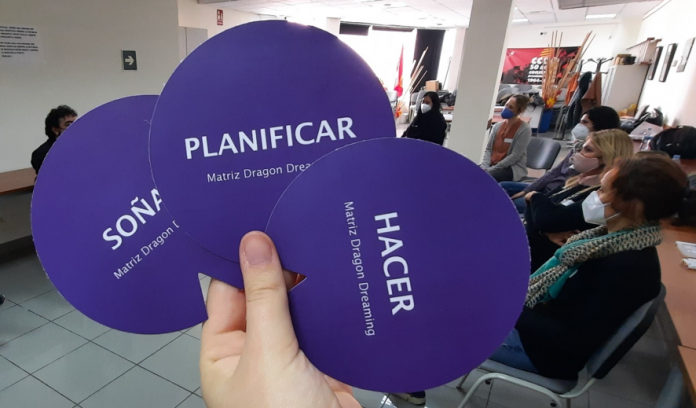The labor market wage rate among Roma is 38.4%, compared to 83.6% among the working-age population, as a whole. Nearly a quarter of Roma (24.1%) declare themselves as dedicated to “family help”, which means they work informally within the family business without labour or social protections, while “family help” as an occupation is practically irrelevant within the overall Spanish population. Another situation that stands out among Roma (and in other impoverished or excluded groups) is self-employment: 48% Roma are engaged in activities on their own, compared to a rate, among the working-age population as a whole, of 18%. The activities or sectors most prevalent among the Roma population are trade (34.7%), mostly in street markets; construction (17.7%); and agriculture (13.8%).
Regardless of the population analysed, women are less active in the labour market than men. But according to data collected during the worst years of the economic crisis, the rate of unemployment among Roma women (39.1%) was lower than that among women as a whole (46%). However, the 2018 FOESSA survey, which compares the situations in 2007 and 2018, reveals that the situation has now been reversed – and by a significant margin. Unemployment among non-Roma women now stands at 18.8%, while among Roma women has risen to 51%. It is interesting to note that according to the FSG/EDIS 2011 survey, women represent a greater proportion of those receiving social aid (67%) than men, but this may be partly explained by them being the ones in charge of the paperwork required for social services on behalf of the household. (By ¨Overview of the integration of Roma citizens in Spain¨, and some transferable lessons for the EU, 2019)
So, already before the COVID-crisis, youth unemployment was structurally high, as many young people struggled with their transition from education to the labour market, dropping out, not being in ther education system, employment or training (NEET). While the average youth unemployment rate in the EU is at 17.8 % (Eurostat 12/2020), there are major disparities between Member States, regions and disadvantaged groups (6.1% in Germany; 40.7% in Spain; 63% of Roma youth in Spain).
Young people who cannot enter the labour market lose their skills and their faith, first in themselves and then in the system.
Their education, training and skills development is not only about building their future, but also about revitalising disconnected regions, innovating the economy, consolidating democracy and securing a sustainable future. (By Gesa Spätling and Jan Wilker in Euroactiv).
These dates and analyses help understand, on the one hand, the complexity of the implementation of SEPAL Project in Spain and, on the other hand, the positive intervention to fill the employment exclusion gaps.
Here, we would like to share the impact of SEPAL Project Spain.
53 young Roma, in their apprenticeship cover, represent the amount of people who are training right now or have already reached this point. The proportion is 32 girls and 21 boys. Girls have been training in fields such as software programming, beauty and cosmetics industry, which is one of the most demanded area for female workers. Many of them did not have any previous work experience in this field and thanks to the project, they have been able to professionalize their skills and turn this passion into a daily job.
We also have a girl certifying as a pharmacy assistant, several girls doing english courses, many of whom work in street markets located in tourist areas. In this context, learning the language allows them to interact with more potential customers. Besides tailoring, leisure time monitor is a way to be able to be with their sons and daughters and also generate an income and long-term job stability. We have also done trainings in organic farming and gardening, literacy and numeracy. We are aware that in the 21st century, all jobs will recquire the ability to write messages, emails, letters and the basic level of writing concerned us. As a result, our proposal was to do specific training in this area, in order to be able to respond to these necessities.
Boys, on the other hand, have been trained in literacy and numerology and english for the same needs as girls. Regarding the audiovisual and musical production industry, many boys are professional musicians and, with the pandemic situation, have lost their jobs. We saw this as an opportunity to offer them support in a time where, unfortunately, the cultural activities have been slowed down or stopped and provide again a feeling of real work. In the end, some of the trainings that have always given us more satisfaction were the organic farming and gardening ones.
The apprenticeship programs, the soft skills trainings, the employment opportunities search and all the social and labour insertion process provided per each NEET, helped Roma youngsters regain their self-confidence and gave them the hope that labour market inclusion is not utopic.
SEPAL SPAIN Staff is putting a great effort into aiming the social and labor inclusion of Roma Youth (24-29 years old). We would like to thank all our partners for trusting and supporting us during these years of cooperation.


